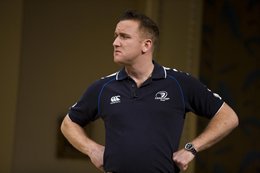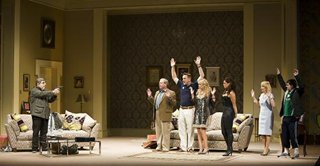Ah, zeitgeist. There’s nothing like the snap of connection when time meets spirit, and we as a society/audience are given the opportunity to do what we love to do best: watch ourselves and our times unfold before us, whether on the silver screen or on the stage. When the Olympia’s big red curtain rises on the sitting room of the O’Carroll-Kellys' Foxrock mansion, revealing son of the house Ross (Rory Nolan) in all his smug khakied-and-Docksided splendour, the house is more than ready to enjoy another round of identification and hilarity, the latest in a series that Paul Howard has created, in a variety of forms, since 1998.
 Ross is in line to hit the pitch in the latest Leinster rugby match — er, sort of. A free kick for charity at halftime, in the O’Carroll-Kelly world of illusion, translates into a big, long-awaited break, and nothing is going to stand in his way: not his ex-con father Charles’ (Philip O’Sullivan) call for a family meeting, not his wide boy son Ronan’s (Laurence Kinlan) birthday, not even the opportunity to mercilessly, and sometimes cruelly, slag off his mum Fionnula (Susan FitzGerald). Add soon-to-be-ex wife Sorcha (Lisa Lambe) and half-sister Erika (Aoibhinn McGinnity) into the mix, and everyone is present and correct for Charles’ horrible announcement: Foxrock is about to be re-zoned, and the profits hoped to be reaped from the selling of the family home are doomed to be lessened even further. No one wants to pay top euro to live in Sandyford East, now do they?
Ross is in line to hit the pitch in the latest Leinster rugby match — er, sort of. A free kick for charity at halftime, in the O’Carroll-Kelly world of illusion, translates into a big, long-awaited break, and nothing is going to stand in his way: not his ex-con father Charles’ (Philip O’Sullivan) call for a family meeting, not his wide boy son Ronan’s (Laurence Kinlan) birthday, not even the opportunity to mercilessly, and sometimes cruelly, slag off his mum Fionnula (Susan FitzGerald). Add soon-to-be-ex wife Sorcha (Lisa Lambe) and half-sister Erika (Aoibhinn McGinnity) into the mix, and everyone is present and correct for Charles’ horrible announcement: Foxrock is about to be re-zoned, and the profits hoped to be reaped from the selling of the family home are doomed to be lessened even further. No one wants to pay top euro to live in Sandyford East, now do they?
Charles’ attempt to buy off a council member is put paid to by the entrance of a gunman (Gary Cooke). Wearing a Brian Cowen mask and toting a Glock, the attempted tiger kidnapping is, due to obvious reasons, a shadow of its former self: despite the threat of violence, the O’Carroll Kellys really don’t have all that much to lose, do they?
No, not really, and by extension, neither does the play itself. Expecting much of anything to be at stake is perhaps the mistake of a critic so newly debouched by the Dublin Theatre Festival. It comes as something of a culture shock to see a piece which, whilst undoubtedly pleasing to its audience, is so parochial as to be virtually unplayable anywhere else in the world. The jokes are so ‘in’ that anyone without even a nodding acquaintance with the names, places and behaviours involved would find themselves utterly adrift.
 But, of course, for Ross et al, this IS the world, and would most likely have, like, a totally massive whatever! to any concerns outside their four Farrow & Ball’d walls. Joe Vanek’s set is perhaps the most successfully well-rounded player in the piece, from its recessed lighting to its fresh flowers in the hearth, stage right. Everything from the drinks trolley to the almost-garish throw pillows is pitch perfect and riding the crest of fashion that is due to crash on the shore of penury at any moment.
But, of course, for Ross et al, this IS the world, and would most likely have, like, a totally massive whatever! to any concerns outside their four Farrow & Ball’d walls. Joe Vanek’s set is perhaps the most successfully well-rounded player in the piece, from its recessed lighting to its fresh flowers in the hearth, stage right. Everything from the drinks trolley to the almost-garish throw pillows is pitch perfect and riding the crest of fashion that is due to crash on the shore of penury at any moment.
The performances, in the main, hit their required pitches as well. O’Sullivan is the embodiment of unrepentant yet avuncular corruption, and FitzGerald is his perfect foil of blow-dried, pastelled self-involvement. Lambe plays her one-note of blondeness with aplomb (and knowing what an accomplished comic actress she is, it seems a shame she’s not got much to do) and McGinnity clenches her jaw sexily as she throws shapes as the black-clad half-sister. None, however, oddly enough, seem to be giving the South Dublin accents their fullest welly, which would seem to be the whole point of the exercise.
It seems strange that Nolan, as the man himself, is so subdued - but he can’t do anything when he’s given so little to do, and it seems a strange choice of the text to sideline him to the degree that it does. Perhaps it is to set the stage for the advent of the son? Kinlan as Ronan is given the best lines, and add to that his unerring sense of timing, the young O’Carroll Kelly spawn was, without doubt, the crowd favourite by the time that big red curtain came down again.
Is the play suggesting that the balance of power will soon be tipping in the direction of our friendly neighbourhood hoods? Given author Paul Howard’s grasp of what’s what, it’s not a huge stretch to make: all his audience needs do is to take a moment to look around itself and see how the recent influx of gun crime alone is escalating to such a degree that it makes the whole notion of a tiger kidnapping seem rather quaint. The world Howard is lampooning may very well be in actual danger, and not merely in peril of losing its fancy touches and expensive cars. This shift might be awfully difficult to stage in the manner to which Howard’s fans have become accustomed. But if it could be? Now, that would be zeitgeist.
Susan Conley is a writer and journalist.